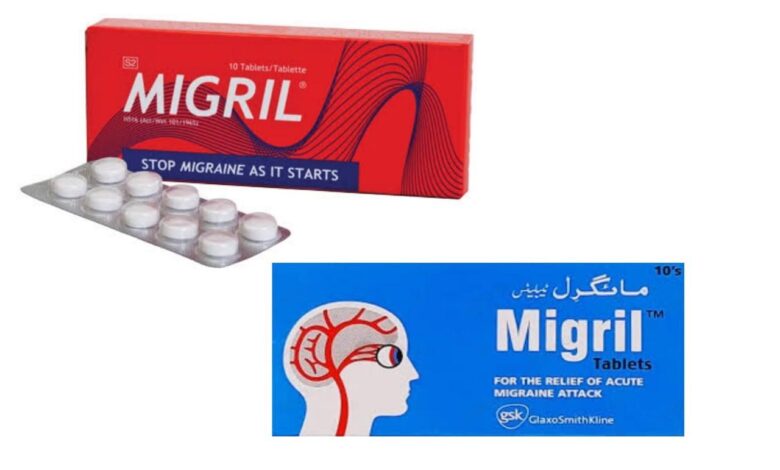Migril Tablets: Ingredients, Uses, Dosage, Side Effects

Migril is a medication used in the treatment of headaches and migraines. A migraine is a common neurological disease that causes a variety of symptoms, most notably a throbbing, pulsing headache on one side of your head. Your migraine will likely get worse with physical activity, lights, sounds, or smells. It may last at least four hours or even days. About 12% of Americans have this genetic disorder. Research shows that it’s the sixth most disabling disease in the world. Each tablet of Migril contains the following active ingredients:
- Ergotamine tartrate 2 mg: Ergotamine is an ergopeptine and part of the ergot family of alkaloids; it is structurally and biochemically closely related to ergoline. It possesses structural similarity to several neurotransmitters and has biological activity as a vasoconstrictor. It is used medicinally for the treatment of acute migraine attacks (sometimes in combination with caffeine), and to induce childbirth and prevent post-partum hemorrhage.
- Cyclizine hydrochloride 50 mg: Cyclizine is a histamine H1 receptor antagonist of the piperazine class which is characterized by a low incidence of drowsiness. It works by blocking histamine and muscarinic receptors in the vomiting center, which prevents the vomiting center from receiving nerve messages from the vestibular apparatus. This prevents disturbances in the middle ear from activating the vomiting center and causing nausea, vertigo, and vomiting.
- Caffeine hydrate 100 mg: Caffeine acts as a central nervous system stimulant. When it reaches your brain, the most noticeable effect is alertness. You’ll feel more awake and less tired, so it’s a common ingredient in medications to treat or manage drowsiness, headaches, and migraines like Migril.
How should Migril be taken?
Acute migraine attacks
Adult: 1 tablet, additional doses of the ½-1 tablet may be taken at half-hourly intervals if needed. To be taken as soon as possible at the 1st warning of a migraine attack.
Max: 3 tablets in 24 hours, 4 tablets per attack, 6 tablets per week, and 2 courses of treatment per month. Ensure an interval of at least 4 days between successive treatment courses.
Overdosage Symptoms
Acute overdosage symptoms: Nausea, vomiting, diarrhea, extreme thirst, coldness, weakness, tingling, and itching of the skin, rapid and weak pulse, hypotension, shock, confusion, convulsions, and unconsciousness. BP may be difficult to measure; may result in fatalities. Further symptoms of peripheral vasoconstriction or CV disturbances may occur but be delayed. Treatment includes using activated charcoal to reduce absorption. General supportive measures should be instituted. IV vasodilators such as sodium nitroprusside infusion may be required to relieve vasospasm. Peritoneal dialysis and forced diuresis may be used to remove ergotamine from the body.
Chronic overdosage symptoms: Peripheral ischemia of the extremities, especially the feet and legs. Gangrene may develop in the toes and fingers. Anginal pain, tachycardia or bradycardia, and BP fluctuations may occur. Excessive use may lead to pleural and peritoneal fibrosis. A rebound headache may occur and is a major withdrawal symptom following the development of ergotamine dependence. Treatment: IV vasodilators e.g. nitroprusside and nitroglycerin may be used to re-establish normal blood flow. Captopril may be used to reverse the effects of chronic overdosage with ergotamine.
What are the side effects of Migril tablets?
Side effects of Migril can include:
- Increased BP
- Hypotension
- Rapid and weak pulse
- Palpitations
- Arrhythmias
- Precordial pain
- Coronary infarction
- Fibrotic thickening of the heart valves.
Cerebral ischemia and thrombosis, blurred vision, sleep disturbances, urinary retention, muscle cramps, and joint pains.
GI symptoms such as nausea, vomiting, constipation, abdominal pain. Dysaesthesia, paraesthesia, formication, tremor, convulsions, headache, extrapyramidal effects may occur. Anxiety, depression, confusion, hallucinations, psychomotor impairment.
Contraindications
Not to be used with potent inhibitors of CYP3A4 and protease inhibitors. Hyperthyroidism, renal or hepatic impairment. Pre-existing vascular disease including coronary disease, obliterative vascular disease, angina, claudication, peripheral ischemia, Raynaud’s syndrome, and hypertension. Not to be used when there is sepsis. Pregnancy and lactation.
Special Precautions
Not to be taken regularly or used for migraine prophylaxis. Increased risk of arterial constriction and other symptoms of ergotism. Discontinue treatment when symptoms of arterial occlusion occur e.g. numbness and tingling of the extremities. Caution when used in patients with infective hepatitis, cardiac disease, or anemia. GI tract obstructive disease, glaucoma, prostatic hypertrophy, or urinary retention may be worsened by cyclizine. May increase the risk of retroperitoneal and/or pleuropulmonary fibrosis. Not recommended for use with other vasoconstrictors. Elderly.
Storage
Store below 25°C.





